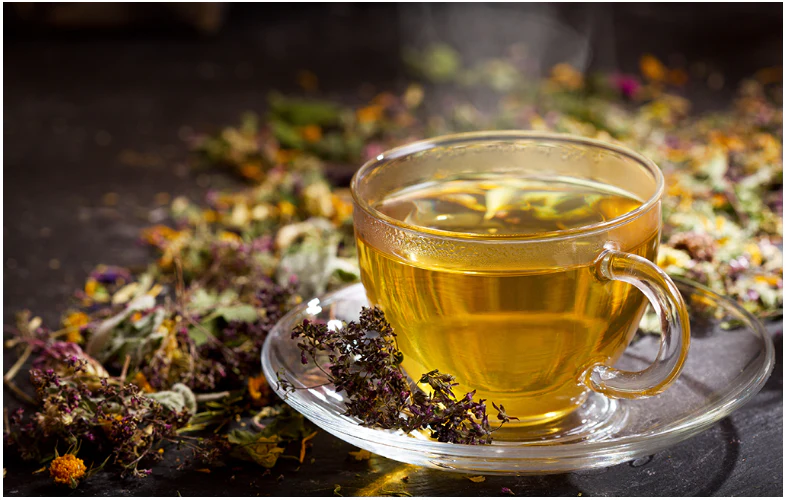Exploring the benefits of Ayurvedic tea opens up a world of natural remedies and wellness practices rooted in ancient wisdom. Ayurvedic teas like ginger, tulsi, and fennel are more than just flavorful beverages; they provide numerous health benefits, from boosting immunity to aiding digestion. In this guide, we’ll dive into the benefits of Ayurvedic tea, along with easy-to-make recipes so you can experience these health benefits at home.

Table of Contents
- What is Ayurvedic Tea?
- Health Benefits of Ayurvedic Teas
- Popular Ayurvedic Teas and Their Benefits
- Ayurvedic Tea Recipes to Try at Home
- Conclusion: Benefits of Adding Ayurvedic Tea to Your Daily Routine
What is Ayurvedic Tea?
Ayurvedic teas are herbal infusions based on Ayurveda, the ancient Indian system of medicine. These teas contain a variety of herbs, spices, and roots, each with specific health-promoting properties. Ayurveda believes in balancing the three doshas: Vata, Pitta, and Kapha. Learn more about Doshas here. Therefore, Ayurvedic teas are often formulated to help restore balance among these doshas, promoting well-being and vitality.
Health Benefits of Ayurvedic Teas
Ayurvedic teas offer numerous health benefits, mainly due to the therapeutic qualities of their ingredients. Here are some of the top reasons to include these teas in your daily routine:
- Improves Digestion: Many Ayurvedic teas include spices like ginger and fennel, which can enhance digestion and reduce bloating.
- Strengthens Immunity: Herbs such as tulsi and turmeric are known to boost immunity, keeping the body resilient.
- Reduces Stress: Adaptogenic herbs like ashwagandha and chamomile can help soothe the mind and promote relaxation.
- Increases Energy: Ayurvedic teas often offer a gentle energy lift, without the jittery side effects of caffeine.
- Supports Detoxification: Certain ingredients like lemongrass and dandelion help the body’s natural detox processes, keeping it healthy and clean.
Popular Ayurvedic Teas and Their Benefits
1. Ginger Tea
Ginger tea is a go-to choice in Ayurveda for its warming qualities. It supports digestion and can relieve nausea.
- Benefits:
- Supports digestion and reduces bloating.
- Provides anti-inflammatory effects, especially helpful for joint health.
- Boosts immune function, especially during colder seasons.
2. Tulsi (Holy Basil) Tea
Tulsi, or holy basil, is revered for its adaptogenic properties, meaning it helps the body handle stress.
- Benefits:
- Lowers stress levels, promoting mental clarity.
- Improves immune resilience.
- Contains antioxidants and anti-inflammatory properties for overall wellness.
3. Ashwagandha Tea
Ashwagandha is a potent adaptogenic herb, commonly used to enhance stress resilience and improve sleep quality.
- Benefits:
- Eases stress and reduces anxiety.
- Supports adrenal health, balancing cortisol levels.
- Enhances focus and cognitive clarity.
4. Fennel Tea
Fennel tea, cooling by nature, is a favorite for supporting digestion and easing stomach discomfort. It also helps balance Pitta dosha.
- Benefits:
- Relieves digestive discomfort and reduces gas.
- Provides antioxidants that protect against cell damage.
- Reduces water retention, helping with bloating.
Ayurvedic Tea Recipes to Try at Home
Here are some simple recipes for making Ayurvedic teas at home. Each recipe uses easy-to-find ingredients and takes only a few steps to prepare.
1. Ginger Tea Recipe
Ingredients:
- 1-inch fresh ginger root, peeled and sliced
- 2 cups water
- 1 tsp honey (optional)
Instructions:
- Boil water and add the ginger slices.
- Let the tea simmer for 5-10 minutes.
- Strain, add honey if desired, and enjoy warm.
2. Tulsi Tea Recipe
Ingredients:
- 1 tbsp dried tulsi leaves (or 3-4 fresh leaves)
- 2 cups water
- 1 tsp honey or lemon (optional)
Instructions:
- Bring water to a boil and add tulsi leaves.
- Simmer for 5 minutes, then strain.
- Add honey or lemon for extra flavor, if you like.
3. Ashwagandha Tea Recipe
Ingredients:
- 1 tsp ashwagandha powder
- 1 cup hot water
- 1 tsp honey (optional)
Instructions:
- Stir ashwagandha powder into hot water.
- Allow it to steep for 5 minutes.
- Strain, add honey if desired, and drink warm.
4. Fennel Tea Recipe
Ingredients:
- 1 tsp fennel seeds
- 2 cups water
- Lemon slice (optional)
Instructions:
- Boil water and add fennel seeds.
- Simmer for 5 minutes, then strain.
- Add a slice of lemon for extra flavor, if preferred.
Conclusion: Benefits of Adding Ayurvedic Tea to Your Daily Routine
Incorporating Ayurvedic teas into your daily routine can be a simple yet transformative way to enhance well-being. With a variety of options—whether for calming with ashwagandha or aiding digestion with ginger—these teas can support both body and mind. Discover these time-honored remedies and start exploring their benefits for a healthier lifestyle. For further reading on the science behind Ayurveda, visit Ayurveda: The Science of Life.

[…] Snacks: Fresh fruit, a handful of soaked almonds, or herbal teas. […]
[…] Drinking herbal teas infused with Ayurvedic herbs like Tulsi (holy basil), Ginger, and Ashwagandha strengthens your immunity. These herbs are known for their ability to support your body’s defenses, fight infections, and reduce inflammation. Exploring the Benefits of Ayurvedic Tea: Recipes and Health Benefits. […]